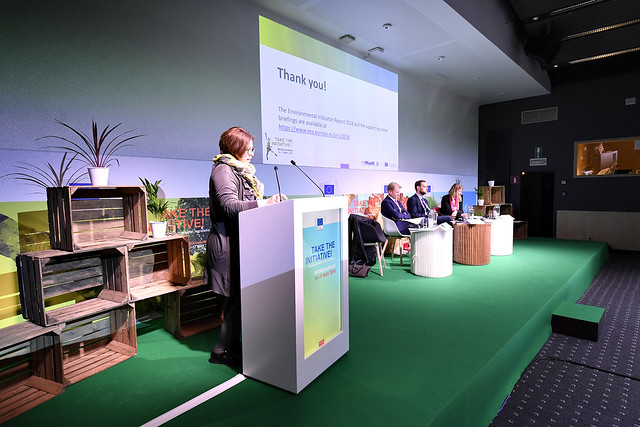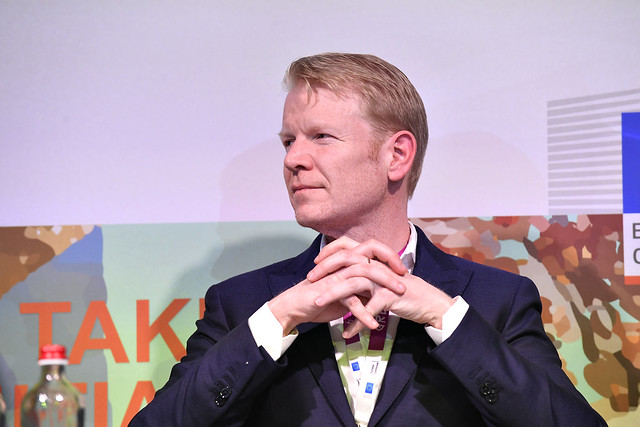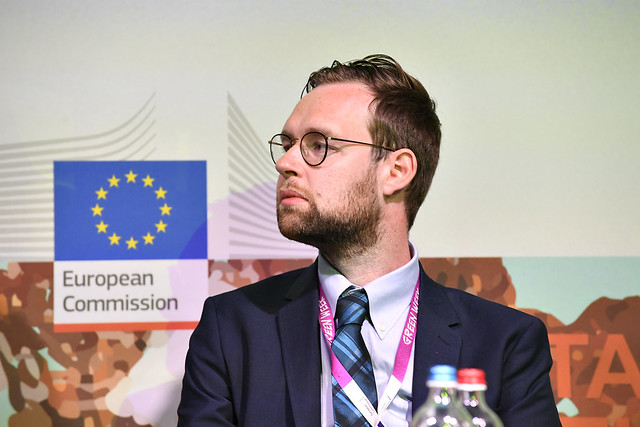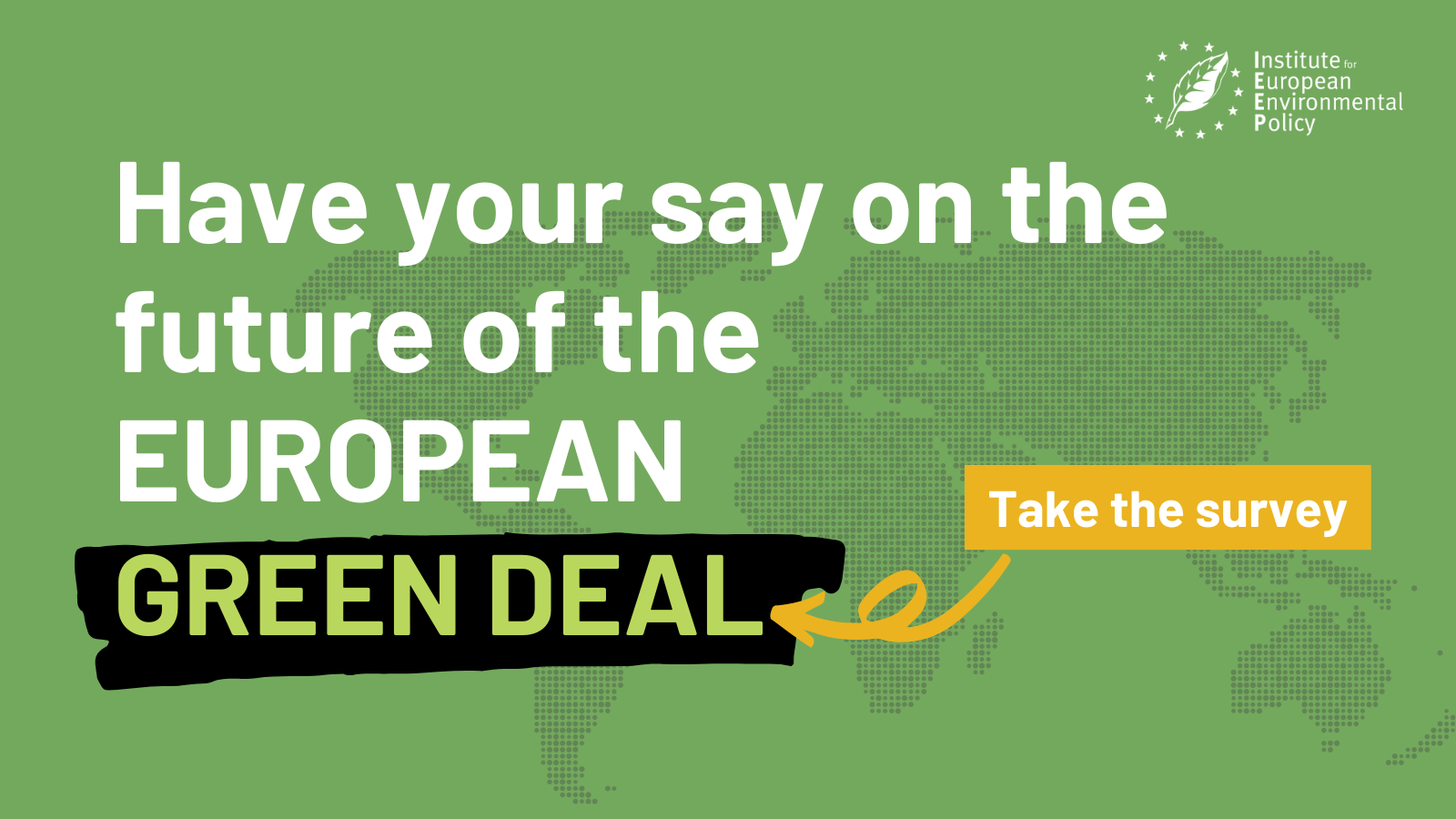Authors: Misty Monteville, Clementine Richer
IEEP was an official partner of the EU Green Week 2019 edition, which focused on implementing environmental legislation.
Céline Charveriat, Executive Director at IEEP, and Martin Nesbit, Head of the Climate and Environmental Governance Programme, each intervened at a session on Thursday, May 16.
While Céline Charveriat took part in a world café around the evaluation of the 7th Environmental Action Programme (EAP), Martin Nesbit spoke in a session of the recent Environmental Governance Assessment framework project led by IEEP, which will be published shortly.
The implementation gap
That same afternoon, IEEP also organised a session on the role of the new European Parliament in closing the implementation gap. Panellists included Aphrodite Mourelatou, lead expert in Strategic Environmental Policies at the European Environment Agency (EEA); Adrian Hiel, spokesperson for Energy Cities; and Tycho Vandermaesen, Head of Public Affairs at WWF European Office. The session was chaired by Céline Charveriat.
Céline Charveriat set the scene with an introductory speech, presenting the Think 2030 platform and the series of related events, including the session itself and the events in Sweden and France that were used to disseminate the recommendations ahead of the elections.
When it comes to the implementation gap, the Think 2030 report – 30X30 actions for a sustainable Europe– contains a recommendation to tackle gaps in the implementation of legislation and in accountability through more effective use of Member State and European enforcement mechanisms and a more systematically facilitated public access to environmental justice.
As the session took place one week before the elections, Celine Charveriat reminded the audience that they were a key moment for the framing of the post-2020 agenda and for the SDGs. Also, she mentioned the context and the public concerns for climate change, and the impact it could have on the elections.

Progress on EAP’s three objectives
Aphrodite Mourelatou, from the European Environment Agency (EEA), then presented the agency’s recently published Environmental Indicator Report 2018.
The report aims at tracking progress by 2020 towards the 7th Environment Action Programme (EAP), using indicators for 29 detailed objectives under three thematic priority objectives. It does so by applying a scoreboard that shows both the indicator’s past trend and an indicative outlook of the EU meeting the selected objective by 2020.
Regarding the first of the EAP’s three objectives – on natural capital – the report points to a significant implementation gap in biodiversity-relevant policies, as several EU indicators past trends have deteriorated and the EU is deemed unlikely to meet the corresponding objectives by 2020.
The picture is more mixed for the EU’s second priority objective – to turn the Union into a resource-efficient, green, and competitive low-carbon economy. The outlook here is still uncertain, notably regarding energy efficiency and energy consumption targets.
As for the third priority objective on environmental pressures and risks to health and well-being, progress is also mixed and mostly unclear due to lack of data.
Overall, the report shows an inverse relationship between the EU’s economic growth and trends in several environmental indicators, pointing to the need for further mainstreaming of environmental objectives into socio-economic policies, in addition to better implementation of existing environmental legislation.
Aphrodite Mourelatou concluded her presentation by stressing the urgency of looking beyond 2020 and acting now against the ecological crisis, in order to limit both the irreversible damages that are already caused and the costs.
Key recommendations
IEEP has recently carried out an analysis of the European parties’ manifestoes, which showed that environmental governance was a blind spot.
Nevertheless, the European Parliament can play a significant role in addressing this issue, as proven during the Volkswagen emission scandal – commonly known as Dieselgate.
During the scandal, the European Parliament set up a Committee of Inquiry to investigate alleged contraventions and maladministration in relevant EU law application[1].
Drawing on this example, Celine Charveriat asked the three speakers what they would say to convince the next Presidents of the Commission and the Parliament to act on the implementation gap.

“Cities at the heart”
“Cities are at the heart of the transition and already driving societal changes. It’s cities that ultimately are going to deliver a fossil free energy system in Europe. They are spearheading the energy transition.” – Adrian Hiel, Energy Cities.
Adrian Hiel, spokesperson from Energy Cities, first intervened by insisting on the importance of cities to ensure the transition.
However, for this to happen, Hiel said, cities need to be treated as partners by the EU institutions, as they are the ones that can put pressure on the Member States to take action.
Like Aphrodite Mourelatou, Hiel insisted on the need to take action now. As young people march in the streets and cities declare a climate emergency one after the other, the Members of the European Parliament (MEPs) have the opportunity to show that they listen to Europeans, and to take the actions that are demanded of them.

“A complementary package”
“WWF calls on the EU institutions to adopt a European Sustainability Pact in the wake of the European elections, consisting of a set of actions on environment and climate set out clearly from the start of their mandate.” – Tycho Vandermaesen, WWF EU.
Tycho Vandermaesen, Head of Public Affairs at WWF European Office, followed by asserting the need to present EU officials with a package tackling different issues in a complementary manner, rather than many distinct proposals, and called for a European Sustainability Pact.
Tackling the implementation gap must be a key component of this, he added, in addition to, among others, climate neutrality by 2040 and a target to restore nature by 2030 – with commitments made at the highest political level.
Tycho Vandermaesen then suggested that two clear actions need to be taken: ensuring the coherence of policymaking and ensuring monitoring and enforcement of these policies.
Regarding policy coherence in particular, he mentioned the need to look at how decisions are taken in Parliament, and the need for Committees to work closer together to avoid inconsistencies such as those seen during the recent Common Agricultural Policies (CAP) negotiations. Tycho Vandermaesen closed by echoing ideas that are circulating regarding an EU semester for climate and environment.
Points of clarification
The session continued with several follow up questions.
Asked what type of funding support cities need, Adrian Hiel mentioned a Just Energy Transition Fund which would allow cities to achieve decarbonisation, and insisted on the importance of mandatory budget lines to finance the transition.
He also talked about the need to match urban and rural resources, explaining that cities cannot be sustainable and independent through their own resources only and need the rural renewable resources that are available around them. He suggested that rural development funds could be used to make sure the investments needed to match rural and urban areas are there.
The subject of strategic litigation also came up several times.
Adrian Hiel suggested that municipalities should be provided with legal advice to be able to bring to court Member States which do not follow their commitments under the Paris Agreement, a trend that is increasing throughout the world.
Tycho Vandermaesen also pointed out the barriers to access to justice on environmental matters within the EU, including costs, lack of knowledge, and protracted procedures. NGOs such as WWF are contributing to bringing national cases to the MEPs, he said, but the EU has a role to play in ensuring equal and effective access to justice in all Member states.
“Targets focus people’s mind. When there are targets in policies, we often see more efforts in implementation.” – Aphrodite Mourelatou, European Environmental Agency.
Aphrodite Mourelatou also insisted on the importance of targets, explaining that they focus people’s minds.
Building on her experience, she added that in areas where there are targets, it is possible to monitor them. When no such targets exist, however, no data is produced, as countries lack incentives to make the necessary efforts to collect it.
She reiterated the need to raise current targets’ ambition and to increase the means used to achieve them. We need to listen more to scientists, and we need to employ more and newer ways – and fast, she said.
Other key messages from the session included:
- The need for the next European Parliament to put the issue of monitoring companies’ sustainability pledges on the agenda
- The need for common targets within the EU, in order to measure progress against a reference value
- The importance of the EU applying sanctions to Member States that do not achieve targets
- The importance of the EU leading by example on the global scene
Looking ahead
Speakers concluded the session by giving their opinion on the effectiveness of the next Parliament in closing the implementation gap.
The general mood was cautious optimism, with all speakers considering that the growing awareness of EU citizens on climate change and loss of biodiversity means that the next Parliament will be under pressure to deliver on these topics.
As two of the speakers said, “failure is no longer an option”. Asked the same question via an online poll, the audience was more pessimistic, with 40% of respondents judging that the degree of effectiveness would remain the same, and only 32% judging that the next Parliament would be more effective than the current one.
Céline Charveriat summarised the discussion by insisting on the importance of acting on multiple fronts, both on implementation and on increasing ambitions.
The next European Commission will have to ensure that sustainability is at the core of the next EU plan, and the new EU Parliament will have to translate the voice of concerned citizens into action, she said.
She concluded by pointing at the gap between scientists and the EU Council and proposed the establishment of a European Panel for Sustainability (EPS), an independent, high-level scientific multidisciplinary body, based on the Intergovernmental Panel on Climate Change (IPCC) model.
The EPS would be dedicated to Europe, cover all the SDGs, and would have a guaranteed independence thanks to adequate statutes and resources. It would give its scientific conclusions directly to the Council, which would have to consider them.
You can read more here on IEEP’s work on implementation.
Panellists:
Adrian Hiel, Spokesperson, Energy Cities – @AdrianHiel
Aphrodite Mourelatou, Lead Expert in Strategic Environmental Policies, European Environmental Agency (EEA) – @EUEnvironment
Tycho Vandermaesen, Head of Public Affairs, WWF EU Office – @TychoVDM
Moderator: Celine Charveriat, Executive Director, Institute for European Environmental Policy (IEEP) – @MCcharveriat
Aphrodite Mourelatou’s (EEA) presentation is available here.
For more information, please contact Céline Charveriat, Clémentine Richer, or Misty Montéville
Photo © Fred Guerdin/EU Green Week
[1] See European Court of Auditors (2019). Briefing paper – The EU’s response to the “dieselgate” scandal.


